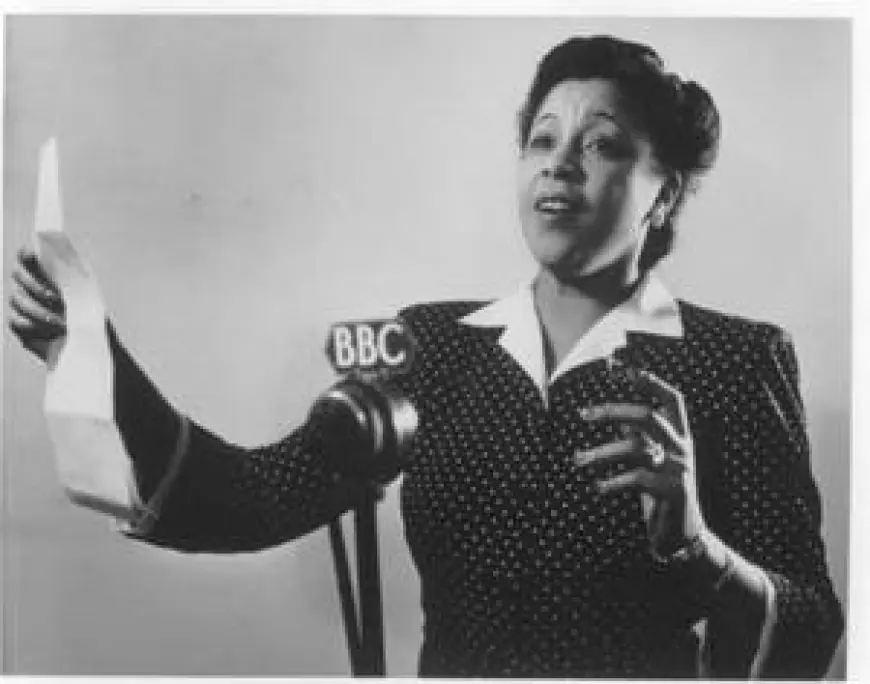Adelaide Hall: The Jazz Icon Who Pioneered a New Era of Music
This composition delves into Adelaide Hall life and heritage, exploring her journey from her early days to her rise as a jazz legend, as well as her continuing influence on music and culture.

Preface
Jazz has produced numerous legends who have shaped its course and left an unforgettable mark on the world of music. Among these settlers stands Adelaide Hall, a name that resonates with the rich history of jazz and the artistic movements that accompanied it. Adelaide Hall was more than just a songster; she was an icon, a trailblazer who readdressed the boundaries of music and helped pave the way for unborn generations of artists. Her donation to jazz and her impact on the music industry have earned her a place in the annals of history.
Beforehand life and onsets
Adelaide Hall was born on October 20, 1901, in Brooklyn, New York, into a family that valued music and creativity. Her father, William Hall, was a music schoolteacher and prominent figure in the African American community, and her mama, Elizabeth, was a singer. Adelaide's upbringing in a musically inclined household played a significant role in shaping her future career.
Family influence and musical roots
Adelaide Hall father, who was deeply involved in church, exposed her to music at a young age. The Hall family frequently gathered around the piano, where Adelaide's mama would sing canticles and hymns. This early exposure to music instilled in Adelaide a love for singing and a deep appreciation for the power of music to connect people and convey emotions.
Education and Early Performances
Adelaide Hall formal education included attending Pratt Institute in Brooklyn, where she studied music and cotillion. Her natural talent for singing and attractive stage presence quickly became apparent, and she began performing in original venues and church choruses. Her early performances were well received, and it was not long before she started gaining recognition for her unique oral style. Listforbes
The Harlem Renaissance: A Cultural Awakening
Adelaide Hall rise to fame coincided with the Harlem Renaissance, an artistic and cultural movement that surfaced in the 1920s and 1930s. The Harlem Renaissance was a time of great creativity and expression for African American artists, pens, and musicians, and Adelaide Hall was at the van of this movement.
The Harlem Renaissance: An Overview
The Harlem Renaissance was a period of artistic revitalization for African Americans, characterized by a flourishing of literature, art, and music. Harlem, a neighborhood in New York City, became the center of this artistic explosion, attracting artists, intellectuals, and musicians from all over the country. The movement was driven by a desire to celebrate African American heritage and challenge the prevailing conceptions and ethical demarcation of the time.
Adelaide Hall part in the Harlem Renaissance
Adelaide Hall was a crucial figure in the Harlem Renaissance, both as a pantomime and as a symbol of the new artistic identity that was arising. Her performances at iconic venues such as the Cotton Club and the Apollo Theater drew large crowds, earning her a reputation as one of the leading jazz vocalists of her time. Adelaide's ability to blend traditional jazz with rudiments of blues and canticles reverberated with cult, helping to define the sound of the Harlem Renaissance.
Collaborations with Jazz Legends
During the Harlem Renaissance, Adelaide Hall banded with some of the most influential jazz musicians of the period. She worked with Duke Ellington, one of the topmost melodists and bandleaders in jazz history, and their collaborations produced some of the most memorable music of the time. Adelaide's collaboration with Ellington, as well as with other jazz legends like Fats Waller and Art Tatum, solidified her status as a jazz icon.

The entertainment industry is breaking down walls.
Adelaide Hall success wasn't just limited to her musical gift; she also broke walls in the entertainment industry at a time when openings for African American players were limited.
The Challenges of Ethnic Demarcation
Adelaide Hall faced significant challenges due to the ethnic demarcation that existed in the United States during her career. Despite her gift and fashionability, Adelaide Hall frequently encountered obstacles that her white counterparts didn't have to face. Still, Adelaide refused to let these challenges define her, and she continued to push forward, breaking down walls and setting new norms for African American players.
Transnational success and traveling
In the 1930s, Adelaide Hall decided to take her career transnational, embarking on tenures in Europe and the United Kingdom. Her performances abroad were met with great sun, and she became a household name in numerous countries. Adelaide Hall transnational success helped to elevate the status of jazz music on a global scale, demonstrating the universal appeal of her art.
The part of Women in Jazz
Adelaide Hall, a successful womanish jazz singer, also challenged the gender morals of her time. The jazz assiduity, like numerous others, was dominated by men, but Adelaide Hall success proved that women could achieve greatness in this field. Her influence paved the way for unborn generations of womanish jazz artists who would continue to break new ground in the assiduity era.
Musical advantages and innovations
Adelaide Hall benefits to jazz music weren't just about her performances; she was also an inventor who brought new ideas and sounds to the kidney.
The elaboration of waste singing
One of Adelaide Hall most significant contributions to jazz was her part in the development of waste singing, an oral style that involves clapping warbles and measures using crazy syllables. Waste singing became a defining point of jazz music, and Adelaide was one of its early settlers. Her capability to produce intricate and suggestive oral lines added a new dimension to jazz and inspired innumerous vocalizers who followed in her steps.
Blending stripes and styles
Adelaide Hall was known for her capability to blend different musical stripes and styles in her performances. She seamlessly intertwined rudiments of blues, philosophy, and canticles into her jazz force, creating a sound that was uniquely her own. This blending of stripes not only improved her music but also helped to broaden jazz's appeal to a wider audience.
Recording Legacy
Adelaide Hall recording career lasted several decades, and her discography includes some of the most iconic jazz recordings of all time. Her recordings with Duke Ellington's symphony, as well as her solo work, are considered classics and continue to be celebrated by jazz suckers around the world. Adelaide's recordings captured the substance of her live performances and assured that her music would live on for unborn generations to enjoy.
Life Beyond the Stage
While Adelaide Hall was best known for her musical career, she was also a multifaceted existence with interests and heartstrings beyond the stage.
Personal life and connections
Adelaide Hall particular life was as rich and varied as her professional career. She was married to Bert Hicks, a British-Canadian saxophonist and bandleader, who played a significant part in managing her career. The couple enjoyed a long and successful collaboration, both tête-à-tête and professionally. Adelaide Hall and Bert's relationship was one of collective respect and support, and they remained devoted to each other throughout their lives.
Philanthropy and community involvement
Adelaide Hall was also deeply married to philanthropy and community involvement. She used her platform to advocate for social causes, particularly those related to ethnic equivalency and civil rights. Adelaide was involved in multitudinous charitable associations and frequently performed at benefit musicals to raise finances for colorful causes. Her fidelity to giving back to the community was a testament to her character and her desire to make a positive impact on the world.
Retirement and After Times
In her afterlife, Adelaide Hall retired from full-time performing but remained active in the music community. Adelaide Hall continued to make occasional appearances and was frequently invited to participate in jazz carnivals and special events. Adelaide Hall benefactions to jazz were extensively honored, and she entered multitudinous awards and honors for her work. Despite stepping back from the limelight, Adelaide remained a cherished figure in the world of jazz until her end in 1993.

Adelaide Hall Enduring Legacy
Adelaide Hall heritage extends far beyond her continuance, as her influence on jazz and music continues to be felt.
Influence on unborn Generations of Artists
Adelaide Hall innovative approach to jazz and her intrepid pursuit of cultural expression have inspired innumerous musicians and players. Her pioneering work in waste singing, as well as her capability to blend stripes, has left a continuing impact on the development of jazz music. Numerous contemporary jazz artists cite Adelaide Hall as a major influence, and her recordings continue to be studied and respected by musicians around the world.
Honors and Recognition
Throughout her career and after her end, Adelaide Hall entered multitudinous honors and recognition for her benefactions to music. She was instated into the International Jazz Hall of Fame, and her recordings have been saved in colorful libraries as important artistic vestiges. Adelaide Hall heritage is also celebrated through paeans and performances devoted to her memory, icing that her benefactions to jazz will never be forgotten.
Cultural Impact
Adelaide Hall impact on culture goes beyond her music. As an African American woman who achieved transnational success during a time of significant ethnic and gender walls, she became a symbol of adaptability and commission. Adelaide Hall story is a memorial of the power of art to transcend boundaries and bring people together. Her life and career continue to inspire new generations to follow their hearts and strive for excellence in the face of adversity.
Conclusion
Adelaide Hall was a true colonist of jazz music, whose benefactions helped to shape the kidney and impact the course of music history. From her early onsets in Brooklyn to her rise as a global jazz icon, Adelaide's trip was marked by invention, adaptability, and a deep love for music. Her capability to break down walls and challenge conventions made her a trailblazer in the entertainment industry and a part model for unborn generations of artists. Adelaide Hall heritage lives on through her recordings, her influence on jazz, and her continuing impact on culture. She remains a testament to the transformative power of music and the continuing spirit of those who dare to conjure.
Also Read This Artilce : Kiersten Jeter: Unveiling the Story Behind This Influential Figure
What's Your Reaction?
















































